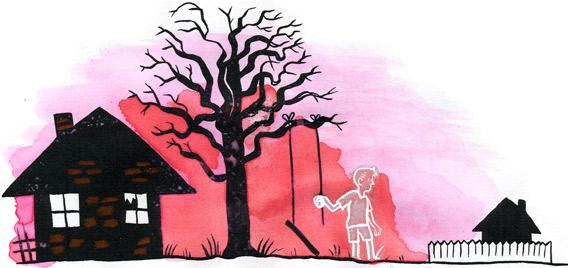Before I had a baby, I remember people telling me that only when I became a parent would I understand what love for another person really was. The act of having a child, they suggested, would automatically initiate me into some secret society of love. I understand why parents say this to anxious parents-to-be: It’s a ritual induction into the ancient guild of parenthood, and a soothing message to pass along when so much of pregnancy is consumed with worry that one won’t know how to love the baby enough.
But on top of seeming divisive, exclusionary, and self-righteous (so the lifelong bonds of childless people are chopped liver?), this vision of parental love as a kind of upgrade of regular love strikes me as inaccurate. In my experience and that of most people I know, the parent-child dynamic, for all its unique rewards and pleasures, is as ambivalent and conflicted as any other relationship in our lives. By moments we may feel infinite, selfless compassion for our children. (Look in on them when they’re sleeping—works like a charm.) But in everyday life we relate to them mostly as the same flawed, selfish, bumbling schmoes we’ve always been. I genuinely hope it’s a myth that becoming a parent somehow admits one to a society of kinder, more spiritually advanced beings, because if such a club exists, neither I nor anyone I know has even seen the door.
In his wrenching debut novel You Came Back, Christopher Coake—a writer with no children himself—inhabits the consciousness of a grieving father with a perspicacity and depth of feeling that permanently give the lie to the notion that only a parent could have something to tell us about the experience of parenthood. A ghost story, a psychological thriller, and a somber reflection on memory and the passage of time, You Came Back is a book that only gradually reveals the true scope of its writer’s ambitions. Coake (who on the basis of his previous book, the short story collection We’re In Trouble, was named one of Granta’s best young American novelists in 2007) starts out slow and methodical, laying in place a wealth of apparently mundane details whose meaning will begin to unfold as the story’s suspense ratchets steadily, unbearably up. There aren’t a lot of novels that can make you weep at their insights about love and loss while also keeping you up till 2 a.m., turning pages in a cold sweat.
Seven years before the novel’s main story takes place, Mark and Chloe Fife’s 7-year-old son Brendan fell down a flight of stairs in their Columbus, Ohio home, broke his neck, and died instantly. In the time since, Mark and Chloe’s once-idyllic marriage has come to a painful end. She’s found a boyfriend, and he’s about to propose to his live-in girlfriend. As the seventh anniversary of Brendan’s death approaches, a strange woman named Connie Pelham contacts Mark with an insistent request that they meet for a conversation: She and her son now live in the Fifes’ former house, and her son claims to have had visions of a little boy who visits his bedroom at night.
As a staunchly unsuperstitious atheist—not to mention a bereaved father just emerging from seven years of corrosive guilt and borderline alcohol abuse—Mark reacts to this encounter with rage and revulsion, forbidding Connie ever to speak to him again. But the “ocean-size, icy-cold” idea of his son as a revenant has been planted in Mark’s brain. Over the next few weeks, as he tries to shield his ex-wife from the importuning Connie while assuring his fiancée Allison that he’s ready to start a new life, Mark begins to lose his sense of certainty about even the most basic binary choices. Is he really ready to start a new life with Allison, or has he not yet gotten over Chloe? Was his decision to quit drinking after a near-fatal bender following Brendan’s death really permanent, or would it be all right to order the occasional Guinness? And (most unsettlingly) is Mark really, positively, 100 percent sure that he doesn’t believe in ghosts?
Coake’s narrative voice is descriptive and detailed, occasionally to the point of flatness (“The next day, a Saturday, Mark spent alone. Allison left him in the morning to go shopping, and then to meet a friend for coffee,” begins a typically captain’s log-style chapter opening.) But his imagery can be chillingly precise in its evocation of the experience of grief (in the first year after his son’s accident, Mark can’t stop hearing the word “dead” as “a slow bubble in tar, expanding and popping and swelling again”). What’s most skillful about Coake’s simple, straightforward prose is less its sentence-by-sentence beauty than its mastery of pacing and emotional tension.

Photo by Stuart Murtland.
You Came Back is ambiguous down to its very title: The “you” in question might refer to either the ghost of Brendan or to the real-life Chloe, who, after years of bitterness and depression, seems reanimated by the possibility that her son still exists in some parallel dimension. Or maybe the “you” is Mark’s past self, the husband and father he once was, come back to pull him away from the new life he’s so painstakingly constructed. The power of this remarkable novel is that Coake allows all these possibilities to co-exist and inform one another, as if at the extremes of human experience grief and joy, past and present, memory and haunting might all be a part of the same vast and unknowable whole.
By imperceptible degrees, the author draws both Mark and the reader into a vortex of unknowing where fear and hope, life and death, longing and fulfillment seem too closely bound to distinguish one from another. Are we reading an objective account of what may be supernatural events, or the self-deluding internal monologue of a mind disordered by grief? And if Brendan’s ghost is in fact haunting the old Fife house, is his presence there an occasion for unutterable joy (as Chloe seems prepared to believe) or does it represent something malevolent and destructive? The third-person narrative voice, which sticks close to Mark’s inner experience throughout, leaves the answers in abeyance up until the final pages.
—
You Came Back by Christopher Coake. Grand Central Publishing.
See all the pieces in this month’s Slate Book Review.
Sign up for the Slate Book Review monthly newsletter.
